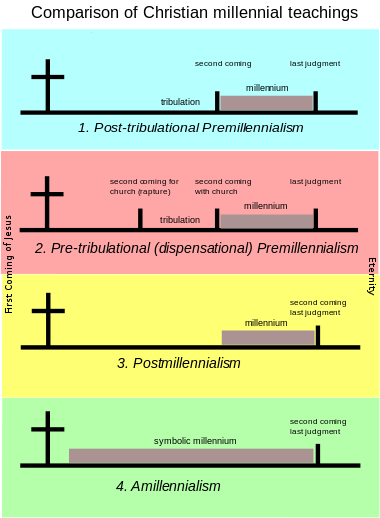Dispensationalism
Dispensationalism, as a theological framework, finds its roots in the expositions of John Nelson Darby (1800–1882) and the Plymouth Brethren movement. Its widespread dissemination is largely attributed to works such as Cyrus Scofield's Scofield Reference Bible.
At its core, dispensationalism presents a unique eschatological viewpoint, characterized by a premillennialist stance and, predominantly, a pretribulation rapture belief. Central to dispensationalist thought is the conviction that the nation of Israel remains distinct from the Christian Church. This distinction underscores the belief that God's promises to national Israel, including those concerning land, are yet to be fulfilled. These promises are seen as culminating in a future millennial kingdom and the establishment of a Third Temple, where Christ, upon His return, will reign from Jerusalem for a millennium.
Dispensationalists espouse a diverse array of beliefs within the evangelical and fundamentalist spectrum. A key tenet is the interpretation of the Book of Revelation not as a historical account of past events, such as the AD 70 destruction of Jerusalem (a view known as Preterism), but as a prophetic vision of future events.
The number of dispensationalism adherents is estimated to be between 5 and 40 million in the United States alone. A pivotal aspect of this theology is its emphasis on Biblical covenants, which are seen as integral to understanding the different dispensations. These covenants, when analyzed and juxtaposed, reveal a historical progression of dispensations. Dispensationalism places significant emphasis on the original recipients of these Biblical covenant promises, leading to foundational beliefs such as the distinction between Israel and the Church.
Another critical element in dispensationalist theology is the commitment to what is termed the historical-grammatical method of scriptural interpretation. This approach advocates for a "literal" interpretation of the Scriptures. Just as Israel literally experienced the curses outlined in the Old Testament, dispensationalists hold that Israel will, in the future, literally receive the blessings promised therein.
The distinction between Israel and the Church is a cornerstone of dispensationalist belief. Israel is defined as an ethnic nation of Hebrews, tracing its lineage from Abraham to the present day. The Church, in contrast, comprises all individuals saved in the current dispensation, spanning from the inception of the Church in Acts to the Rapture.
Dispensations
Below is a table comparing the various dispensational schemes:
| Range of Bible Chapters | ||||||||
|---|---|---|---|---|---|---|---|---|
| Schemes | Genesis 1–3 | Genesis 3–8 | Genesis 9–11 | Gen 12 to Exodus 19 | Exodus 20 until Birth of the Church | Church Age until Rapture | Rev.20:4–6 | Rev. 20–22 |
| 7 or 8 Dispensational Scheme | Innocence or Edenic | Conscience or Antediluvian | Civil Government | Patriarchal or Promise | Mosaic or Law | Grace or Church | Millennial Kingdom | Eternal State or Final |
| 4 Dispensational Scheme | Patriarchal | Mosaic | Ecclesial | Zionic | ||||
|
3 Dispensational |
Law | Grace | Kingdom | |||||
In alignment with mainstream dispensational thinkers such as Scofield and Ironside, I concur that the inception of the Church, distinct from Israel, is marked by the events of Pentecost as narrated in the second chapter of Acts. This perspective is commonly referred to as the "Acts 2" position.
Grace Movement
Within the sphere of Dispensationalism, there is a segment known as the Grace Movement. Adherents of this movement posit that the Church's genesis occurred subsequent to the events of Acts 2, placing significant emphasis on the ministry of Paul. This perspective is often termed the Pauline doctrine or, in contemporary discourse, the Hyper Grace movement. While acknowledging its existence, I do not subscribe to this doctrinal stance, and a detailed theological discourse on these divergent views is beyond the purview of this paper.
Pre-tribulation
As a dispensationalist, my beliefs are in line with those of pre-tribulation premillennialists. I uphold the conviction of a future, literal 1,000-year reign of Jesus Christ, which seamlessly transitions into and perpetuates in the eternal state within the "new heavens and the new earth." I maintain that the millennial kingdom will be theocratic in nature.
Dispensationalism is particularly noted for its perspectives regarding the nation of Israel during this millennial reign. In this eschatological framework, Israel is envisioned to play a pivotal role, envisaged to regain a monarch, territory, and an everlasting kingdom.
Among dispensationalists, the predominant view is that of the pretribulation rapture, although there are smaller factions within the movement that advocate for either a mid-tribulation or post-tribulation rapture.
Dispensationalism and Israel
Dispensationalism firmly repudiates the concept of supersessionism, recognizing the Jewish people as the authentic people of God. It views the contemporary State of Israel as a precursor to the Israel of biblical prophecies, a national entity destined to receive the fulfillment of all Old Testament promises from God, as prophesied in texts such as the book of Ezekiel, which is perceived as being fulfilled presently.
John Nelson Darby, a pivotal figure in dispensational thought, and his intellectual successors, myself included, have consistently upheld the belief that God regards the Jews as His chosen people, even as they continue to reject Jesus Christ. In the dispensational and prophetic framework, God maintains a specific role for them.
Dispensationalists assert that a remnant within Israel will undergo a spiritual rebirth, be called by God, and, through grace, come to the realization that they crucified their Messiah. A distinctive teaching of dispensationalism is that the Church represents a temporary interlude, a "mystery" period not explicitly revealed in the Old Testament. This era is anticipated to conclude with the rapture of the Church, followed by the entry of the Jewish remnant into the Great Tribulation.
During this Tribulation, it is believed that Israel will ultimately acknowledge Jesus (Yeshua) as their promised Messiah (Yeshua Ha'Mashiach). Darby's teachings envisage Judaism as enjoying God's protection until the very end of time and propose that God has distinct plans, or 'programs' in J. Dwight Pentecost's terminology, for Israel and the Church.
Dispensationalists teach that God's eternal covenants with Israel are unbreakable. While emphasizing that God has not abandoned those of Abraham's lineage through Isaac, they also affirm the necessity for Jews to accept Jesus as the Messiah. They maintain that God established unconditional covenants with Israel as a people and nation, specifically through the Abrahamic, Palestinian, Davidic, and the New Covenant.
Within my dispensationalist belief, along with many other Christians and Messianic Christian churches and believers, I embrace what some critics have derogatorily termed Judeophilia. This encompasses support for the state of Israel, possibly including the observance of traditional Jewish holidays and the practice of certain Jewish religious rituals. As a dispensationalist, I support the modern state of Israel, recognizing its existence as a manifestation of God's will for the Last Days, and wholly and fully reject anti-Semitism.








